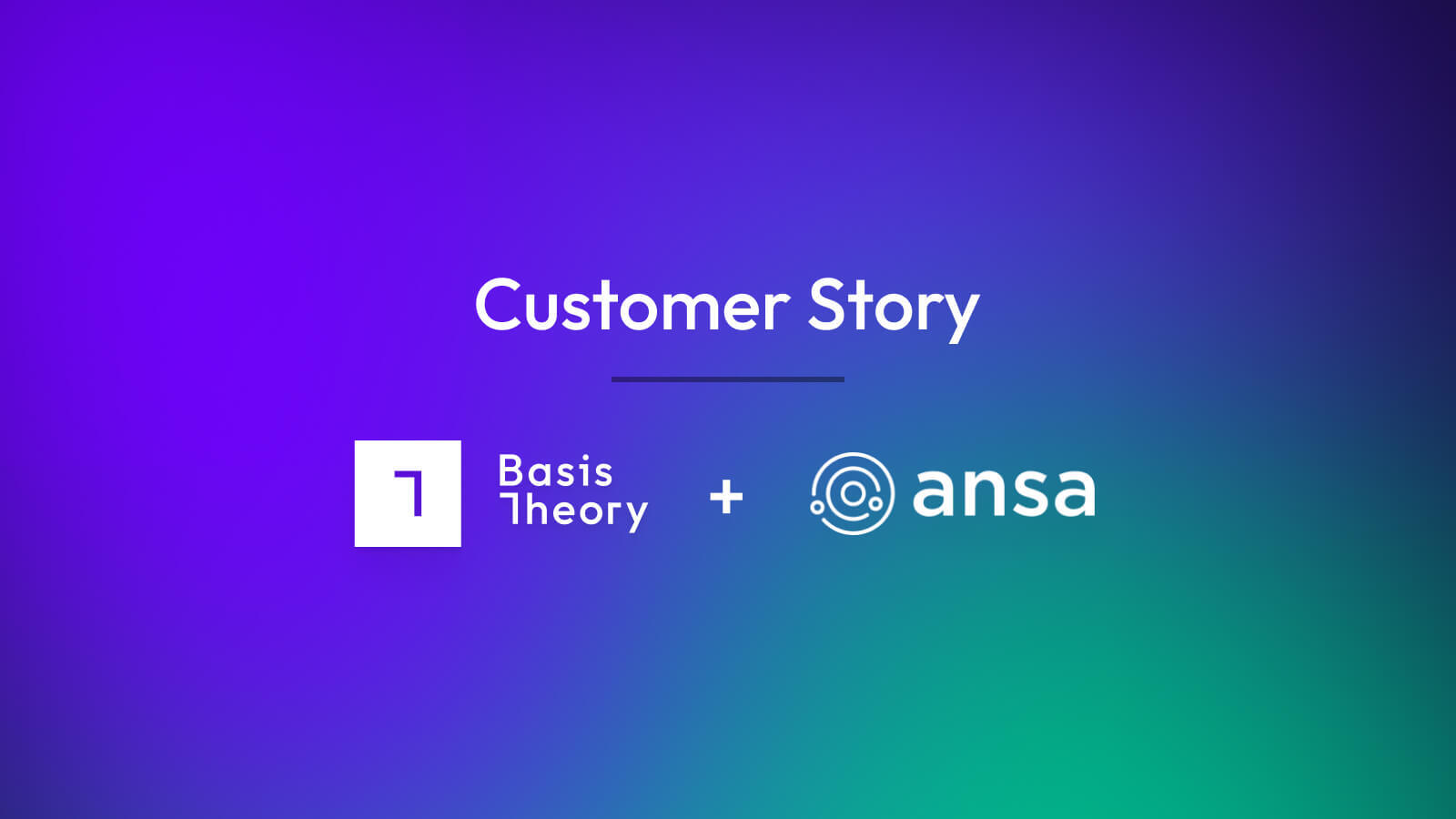Ansa Leverages Basis Theory’s Flexibility to Manage Payments Securely
95%
PCI Scope Reduction
CDE
Outsourced
Enabled
PSP Optionality
Key Insights
-
Enhanced Payment Flexibility: Ansa, powered by Basis Theory, allows businesses to implement closed-loop payment systems.
-
Accelerated Integration: Ansa's technical team integrated with Basis Theory quickly, facilitating rapid deployment of their services to clients.
-
Scalability and Future-Proofing: The flexibility allows Ansa to accommodate various payment processors used by current and future clients, ensuring scalability and adaptability to diverse customer requirements.


Name
Website
Location
Industry
Features
- Proxy

For businesses that work with small transactions, the costs of taking credit cards can be expensive especially because of the fixed fees involved. Meanwhile, common solutions like bundling transactions or pre-paid loyalty programs can be a huge undertaking to implement and manage. That's where Ansa comes in.
“The economics of payments haven't really changed in the last 70 years…but the types of interactions merchants want to have with their consumers have changed a lot,” reflected Ansa's co-founder, Sophia Goldberg. “We saw merchants building hacks for the commerce they want so we are providing white label, closed loop ecosystems to let merchants own their commercial interactions with their customers.”
Ansa's Platform for Merchants
Ansa's platform allows businesses to create and manage digital balances for their customers, making it easy to improve unit economics, drive retention, and provide a better customer experience. With Ansa, a business’ most loyal customers won’t cost them the most. “Some examples of this include micro payments, coffee shops, quick-service restaurants, and creator economy platforms. When you have a small transaction size, it's the fixed fees of payments that add up quickly and inhibit what these merchants can do; They can't charge a $1 transaction without losing 30%+ or more just on fixed fees,” said Sophia.
“We're letting merchants have the same type of payment experience as the Starbucks balance. They can quickly go live and embed customer balances. APIs let them reload the balance, use the balance, incentivize usage, etc.” commented JT Cho, technical co-founder at Ansa, “Ansa operates as a payment gateway on top of whatever payment processor our merchants are using. If a coffee shop is using Stripe to process all the payments, we would sit on top of that.”
Because they are interacting with payments data, the platform needs to be PCI compliant. But Ansa's co-founder, Sophia Goldberg, knew just how complex it could be to ensure compliance while moving quickly. Sophia literally wrote the book on payments, The Field Guide to Global Payments, and wanted to avoid the complexity that PCI compliance would introduce into their platform. “I come from payments, so I'm very aware of PCI compliance, what a data breach can mean, and how to keep all of that up to date. Maintaining PCI compliance requires significant operational and regulatory resources, not to mention engineering and data security costs. It's a lot to take on and we don't have the luxury of possibly screwing up. So for us, prioritizing compliance from day one was really important,” said Sophia.
Evaluating Basis Theory's Tokenization Platform
Sophia was aware of Basis Theory’s tokenization platform and her technical co-founder, JT Cho, started an evaluation of the platform. “Because both my co-founder and I come from payments and have a sense of responsibility around holding peoples’ financial data, going with a partner made a lot of sense,” said Sophia. JT and his team were immediately impressed that the platform gave them the flexibility they needed while allowing them to develop quickly with technologies they are familiar with.
JT saw that Basis Theory gives them the flexibility to work with the payment processors their current and future customers will use. “Right now if our customer has an existing relationship with a payment processor, like Stripe or Adyen, we have to be able to forward the card data to that processor. With Basis Theory, we only create a token once and reflect it into the downstream PSP,” commented JT, “As we start to go more into enterprise, we're going to start seeing more requirements for using other payment processors.”
“Hyper focus is the name of the game at this stage in our company and we want to keep our team really lean because it gives us more shots on goal. We are staying focused on what our merchants need and how we can solve it. Anything that we don't need to touch right now we don’t. If there's a vendor and a partner we can trust, let's use them instead,” said Sophia.
This flexibility also allows Ansa to continue iterating on their core value proposition: for payments to be a tool rather than a hurdle for their customers. “Long term the ideal for us is we can help our customers see that they don’t have to be locked into using one payment provider; They can use other PSPs that work for their business without needing to update the Ansa integration,” reflected JT.
Simplifying PCI Compliance with Basis Theory
The team also saw how much it would simplify their PCI compliance process to use Basis Theory as their cardholder data environment (CDE). By keeping the CDE with Basis Theory, Ansa would reduce the number of requirements their team was responsible for under PCI by 95%.
JT and his team were able to get a proof of concept up and running within a couple of days, and the PCI audit was extremely fast. Ansa was able to do an SAQ-D containing over 300 questions after answering just four questions from Basis Theory, essentially limiting the information required to an SAQ A-EP.
Thanks to Basis Theory, Ansa was able to simplify their PCI compliance process and get to market quickly. And because Basis Theory can handle the cardholder data environment, Ansa can move quickly as they add new functionality to their platform.
Basis Theory enables Ansa to focus on what they do best: create the best platform for enabling businesses to reduce payments costs and build lasting relationships with their customers.
.png?width=365&height=122&name=BTLogo%20(1).png)


